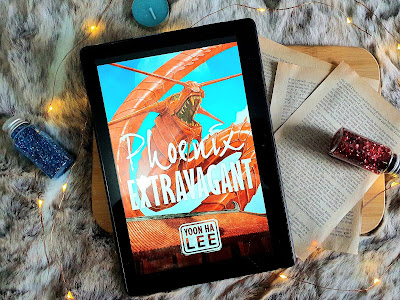Originally published on Set The Tape
'Gyen Jebi isn’t a fighter or a subversive. They just want to paint. One day they’re jobless and desperate; the next, Jebi finds themself recruited by the Ministry of Armor to paint the mystical sigils that animate the occupying government’s automaton soldiers.
'But when Jebi discovers the depths of the Razanei government’s horrifying crimes—and the awful source of the magical pigments they use—they find they can no longer stay out of politics. What they can do is steal Arazi, the ministry’s mighty dragon automaton, and find a way to fight…'
Phoenix Extravagant by Yoon Ha Lee is a story that instantly jumped out at me. Set in a fantasy land inspired by Korea under Japanese occupation, containing a mixture of magic and technology, and with a giant mechanical dragon on the front cover. I mean, what’s not exciting about that set up?
The story follows Jebi, a non-binary artist who lives in Hwaguk, a country that is living under the occupation of Razanei, a neighbouring nation who defeated their forces a decade before. Jebi has been living with their older sister, trying to find steady work as an artist, but failing despite their skills. Jebi isn’t a prodigy by any means, but still competent enough that they feel they can make a living from their craft. When Jebi discovers that the Ministry of Armour is looking for artists they find themselves recruited to help the forces occupying their nation.
Jebi thinks that they’re being recruited to help paint the magical symbols onto automata, artificial soldiers that patrol the city and guard Razanei facilities. However, they discover that they’ve been recruited to work on one very particular automata, a ferocious new war machine in the shape of a dragon.
One of the things that makes Phoenix Extravagant interesting is the fact that unlike other lead characters Jebi isn’t a fighter. They’re not a rebel, standing against an oppressive regime and fighting to free their home. They’ve accepted that this is the way things are now. They’ve begun to assimilate, even having adopted a Razanei name, to help with their art. Jebi is very much being swept into a story they don’t want to be a part of. They’re an ordinary person out of their depth, and this doesn’t really change much over the course of the story, and in the moments where they’re forced to take action it’s very clear that they’re not equipped for this, and they’re sometimes a little useless.
Thankfully, there are a few other characters around Jebi who do know what they’re doing, and they’re great. Vei is initially introduced as the a potential foe, a duellist working for the Razanei forces assigned to watch over Jebi. Deadly in ways that Jebi could never hope to emulate, the romance that begins to blossom between the two of them is one of the more interesting parts of the book. Whilst it’s not quite an enemies to lovers narrative, their opposing political standings make it a romance that definitely has its issues, and holds more risks than just a broken heart.
One of the best characters, however, is Arazi, the mechanical dragon. I won’t say much about them so as not to spoil the story, but they’re more than I first expected, and their journey through the novel was just as engaging as any of the human characters. They’re not just a machine, despite their origins, and are a being with its own thoughts and feelings, ones that I always wanted to learn more about.
Whilst Arazi is brilliant, they’re also one of the downsides of the book, or rather the lack of time we spend with them is. Jebi is the central character, and we spend so much time with them, and by the end of the book I had a good grasp of who they are and their personality, but I wanted more with Arazi. I wanted Jebi to just sit down and talk with Arazi, to have a whole chapter of the two of them just engaging so we could learn more about this amazing creation.
This would be something that I would hope for in a sequel, but it’s not clear by the end of the book if this is something that we might ever get. The book ends with the words ‘The End’, so it seems like this is it for this world and these characters, but it feels like there’s so much more left to tell. Yoon Ha Lee has left enough story threads dangling that they could easily return to this world, and I really hope that they do, because I wanted more.
Despite being left wanting more I thoroughly enjoyed the book. The setting and story felt new and unique, and I adored the amount of queer representation it had. Not only was the lead character non-binary, but we had same sex relationships, families where people had three parents in a polyamarous relationship, and none of these things were commented on as out of the ordinary or strange. It was a world where people didn’t get hung up on gender or sexuality, and it was amazing.
If you’re looking for an engaging fantasy story that isn’t just going to give you the kind of things you’ve read before this is a definite must read.

No comments:
Post a Comment